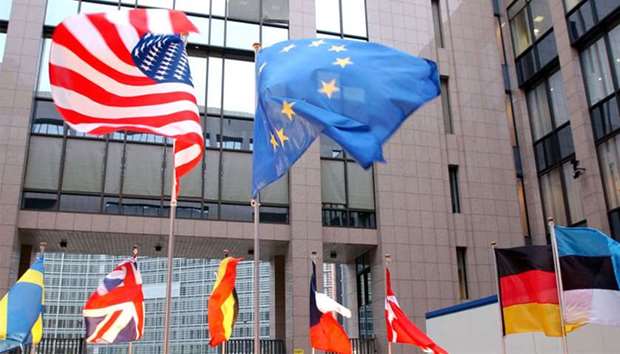The United States and the European Union used to walk in lockstep when it came to sanctions on Russia. No longer.
The allied efforts begun during the Obama administration were meant to push a resolution of the Ukrainian crisis after Russia’s annexation of Crimea and its rather obvious but unacknowledged efforts to destabilise the eastern parts of Ukraine. However, the latest round of punitive measures, passed overwhelmingly by Congress last month and signed, albeit reluctantly, by President Donald Trump, exposed serious disagreements among the Western allies.
The measures, fuelled in part by a desire to punish Russia for its interference in the 2016 US elections, order new sanctions on companies involved in Russian-financed offshore oil projects and oil and gas pipeline construction. Though Russia is the intended target, European nations and businesses could suffer as well.
That’s why senior European politicians, particularly in Germany, have criticised the new sanctions heavily, fearing what they could mean for the local energy industry.
“The US bill could have unintended unilateral effects that impact the EU’s energy security interests,” EU chief executive Jean-Claude Juncker said in a statement. “’America First’ cannot mean that Europe’s interests come last.”
Criticism in Germany has focused on the sanctions’ potential impact on Nord Stream 2, a gas pipeline from Russia to Germany through the Baltic Sea. The almost $11bn project was expected to be operational by 2019. Business interests from Germany, Austria, France, the Netherlands and Britain all have a stake in this effort, and new sanctions seem to put its future in doubt.
The German Foreign Minister, Sigmar Gabriel, has gone so far as to criticise the sanctions as an opportunity for US energy companies to boost their earnings by barring Europeans from doing business with their Russian rivals and also exporting more liquefied natural gas from the United States to Europe.
“Sanction policies are neither a suitable nor an appropriate instrument for promoting national export interests and the domestic energy sector,” Gabriel said in a statement. “Our stance remains that we will not accept any extraterritorial use whatsoever of these US sanctions against European companies.”
Brigitte Zypries, who followed Gabriel as economy minister, urged “countermeasures” against the United States for the sanctions. “We consider this to be a violation of international law,” she said.
Such comments will easily please Russian President Vladimir Putin, who is always up for driving a wedge into transatlantic relations. In fact, the German criticism echoes statements by the Russian leader about the United States’ promotion of its own exports.
Politicians and businesspeople, if associated with Russia, like to pretend this is all just about business. It’s not.
The EU may actually be more concerned about markets and basic questions about who controls the energy supply. For the Kremlin, energy equals power. Nord Stream is a subsidiary of Gazprom, the Russian energy conglomerate. Moscow has a long and ruthless tradition of using energy policies to enforce political interests. The people of Ukraine and Belarus have experience with this.
Accordingly, some members of the EU, especially those in the eastern part who have distinct and painful memories of dealing with Moscow during Soviet times, do not want to be dependent on Russia for their energy needs. Currently, Russia supplies about a third of gas imports to the EU, with some countries getting 100 percent of this vital resource from the Russians.
From this perspective, US sanctions affecting European companies might have a positive side.
As tensions continue to rise between Russia and the West, the need for a diversified energy portfolio grows more obvious, not only for energy security, but also to fuel stronger competition among the energy giants.
Brussels, home base for the EU, wants to diversify energy supplies and routes but has failed so far. Germany has been putting its own economic interests first. For example, part of the controversy surrounding Nord Stream was that it bypassed other countries.
It was Gerhard Schroeder who put Nord Stream on track while he was chancellor of Germany – and this led to his very well-paid position as chairman of Nord Stream’s shareholders committee after he left office. He is also chairman of the board of Nord Stream 2. This association taints members of Schroeder’s old party, the German Social Democrats, such as Gabriel and Zypries, with a whiff of scandal.
Clearly, and understandably, the EU doesn’t like US interference in its domestic politics, nor does it like being dragged into a trade war between the United States and Russia. And perhaps the United States can do a better job in the future of co-ordination on sanctions. But the potential bright side of this spat among allies is the realisation that the EU must work harder on its energy security, including a diversified supply system. All EU member-states should join in developing an advanced and stable energy policy – even if it takes a little nudge from outside to get the ball rolling. – Tribune News Service
* Oliver Bilger is a writer for Berlin’s Der Tagesspiegel newspaper who is working with The Philadelphia Inquirer as part of the Arthur F. Burns Fellowship Program. Readers may send him e-mail at [email protected]

